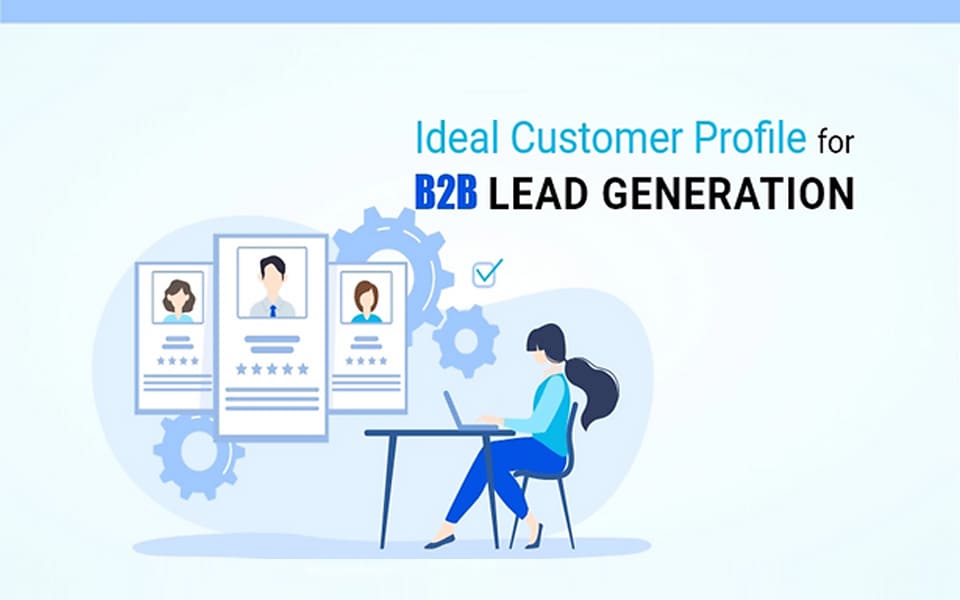Subscribe to Our Newsletter
Stay updated with the latest tips and strategies. Get additional discounts and alerts on offers.

“Selling to everyone with a heartbeat means you don’t have a finger on the pulse of the ideal customer.” – Paul Reilly
Any salesperson or marketer will agree that businesses cannot survive without an ideal or loyal customer base irrespective of location, industry, or size. It is almost inevitable for brands to combat shifting customer loyalties with changing marketing dynamics and introducing new brands.
However, if you do not know who you are looking for in such a scenario, how will you know when you find them? Building an ideal customer profile for lead generation in the B2B industry is necessary when facing this dilemma!
In a layman’s language, an Ideal Customer Profile is a hypothetical description of the type of organization or company suited to convert into a paid customer of a particular product or a service.
The ICP, built based on various factors delved in the latter part of the article, lists those high-value best-fit companies with the quickest sales cycle and can be deemed beneficial for your brand. In short, it is the profile of a potential customer that can develop the perfect mutual relationship with your company.
Potential:
He/she has shown interest in your product or service by visiting your website, generating conversation through online sources, or being referred to you by a third party.
Loyal:
He/she has been a contact consumer of your product/service, irrespective of price, competitor brands, features.
New:
He/she is new to your CRM family, having consumed your product/service once or twice. They have the potential to be a loyal customer if the pain points are met efficiently.
Discounts/Convenience seekers:
He/she is otherwise dormant and shows interest in your product/service only when there are offers or running promotions.
Former:
He/she used to be your consumer but has been inactive for a long time. The causes for this can be – change in location, job title, contact details, or inclination towards another brand.
Informed:
He/she is aware of the market and the services offered by other competitive brands. You can identify the group by their online presence behavior and conversations they take part in.
Reluctant:
He/she is tough to transform into a paying customer despite numerous marketing tactics. This might be owing to factors like budget, location, and need.
Impulsive:
He/she falls into the same group as the reluctant but can be identified or defined better by income. Often impulsive buyers spend more than their set budget, only never repurchase it.
Brand buyers:
He/she mostly buys from reputed brands and is highly unlikely to invest in medium and small-scale brands.
Bargain seekers:
He/she seeks a profitable bargain and is likely to incline towards the brands which offer them the same.
Presence
Fear, pains & objections
Conversational pattern
Buyer behavior
Core attributes
Company name – XYZ
Industry sector – Pharma manufacturing and distribution
Company size – 10,000+ employees
Estimated growth PA – 40% growth on y+y
Location – Europe, USA, Japan, India, South Africa, New Zealand (will expand to 50+ countries by 2030)
Additional attributes
Technology for CRM used – XYZ
Using it since – 2013
Business objectives – Short term- 50% growth in lead generation; Long term- get funding to establish a data analytics software
Services offered by XTZ technology – Data assimilation, AI analysis, direct integration, and so on.
Pain points – Individual access to the database by each team, hence the need to create multiple data administrators
Decision-makers – CTO, Technical Head, Partner, Owner
Other attributes – Loyal customer of XYZ software; known brand for SaaS industry thought leadership
Annual marketing budget – $50000
Name – Steve Kilmer
Company – XYZ
Location – Pan global
Industry sector – Retail
Professional background – Highly interested in technological innovations. Worked in XYZ Company as Technical head for eight years. Has a Masters in Software Manufacturing from XYZ university. With 30 years of experience in the retail, manufacturing, and distribution industry, he/she is committed to creating a sustainable growth channel for the brand he is associated with.
Hobbies and behavior – Tech-savvy, attends webinars, seminars, fairs, and conferences related to technology
Hierarchy level – A class
Restuarant name – XYZ
Type – Fine dining
Location – Paris
Chains(if applicable) – Delhi, New York, Shanghai, Tokyo, Singapore, Berlin
Goals – Willing to explore more metro cities in South East Asia and European countries in 2021
Primary cuisine type – Multi-cuisine
Specialty – Lebanese cuisine
Seating capacity – 200+
Ambiance – Not suited to families, best suited for corporate dinners
Owner/Manager/Key-decision-maker – Mr. ABC, Regional Manager of South East Asia
Lead generation in the B2B industry is a tricky business. When salespeople in the B2B industry focus on a specific market segment to attract and generate leads, it polishes the marketing game. It ensures that the partnership is mutually beneficial and achieves a significant success rate.
Customer profile analysis is essential to attain maximum results from building an ICP. A basic example of a customer profile analysis can be
An ideal customer profile analysis would be Case – A cement brand to launch its product in Kentucky
Industry sector – Construction (and other related industries)
Revenue size – 30% or more annual revenue
Expenditure budget – $ XYZ
Current cement usage brand – XYZ
Location – Kentucky and other nearby areas
Company size – 1000+ employees
Association – Commercial building projects
Pain points to address – (if any)
Other benefits of building an ICP that bring you close to successful B2B lead generation

Depending on the product, service, or brand marketed, one may want to include other insights to identify the right audience segment. As cited above, different companies leverage different methods to develop their ideal customer profile. But the most beneficial and typical one is where they look at the best customers of their current times and analyze what they have in common to develop customized solutions.
Have a look at the method we are talking about –
Many companies rely on employing a team of data miners, data scientists, and data analysts to gather data insights. They mostly rely on AI tools to collate the data. However, one major drawback of following this method is that the data might comprise many anomalies due to the lack of manual verification.
Companies are increasingly inclining towards professional database providers for the sake of data collection. We provide a top-quality 360 database solutions-including customized mailing lists exclusively tailor-designed to your requirement. So, if you are looking to minimize your efforts to design an ICP or want a high-quality manually verified dataset of your ICPs, DataCaptive is the place to be.
When the data collected is put into categories based on similarities, it gives salespersons better access, analysis, and data for profitable lead generation and multi-channel marketing campaigns.
DataCaptive categories its master database into four broad categories –
DEMOGRAPHY – Age, Gender, Location, Job-title, Income, etc.
GEOGRAPHY – Location, Postal address, Phone number, etc.
FIRMOGRAPHICS – Company size, Revenue size, etc.
BUYER-PSYCHOLOGY – Online search behavior, Consumption history
Once the data is segmented, the most valuable accounts should be listed separately to target them with ABM tactics. The best clients are represented by the ideal customer circle, succeeded by the potential customer circle.
Design your ideal ICPs by noting down intrinsic contact details like company name, URL, size, revenue, social media handles, location, and so on.
Start your data-driven lead generation campaigns to drive sales and attain maximized sales numbers. DataCaptive’s lead generation service puts your business on a global stand with intent-based leads. It is a great way to drive your business growth with insights that focus on your customers’ intentions.
A basic template for an ideal customer profile would look like this.


The difference between ideal customer profiles and buyer personas many times is heavily blurred. While ICP is a specific segment of the market or an organization, buyer personas are hypothetical profiles of ‘people’ or executives of the organizations involved in the decision-making process.
Tip – Using buyer personas in an email campaign increases open rate by 2X and click-through rate by 5X. (Source – MLT Creative)
Many B2B marketers would agree that ICPs need to be updated in a specific interval to be highly effective in lead generation. The question that arises here is how to update existing ICPs for a maximum response? You should –
An accurate and authentic CRM database helps you analyze your database better and build more successful lead generation in return. DataCaptive’s data enrichment services allow you to access a complete structured quality dataset and enhance your outreach and customer experience.
When you review both positive and negative feedback, it helps better understand your audience’s mindset and requirements. This goes a long way in analyzing the audience and the market and transforming your service accordingly.
Utilize tools to analyze both organic and inorganic traffic. Google Analytics is a universally favored tool used to track consumer behavior, which can reveal plenty of details about visitors to your website. By analyzing your audience’s behavior, you can learn more about what they’re most interested in spending time on.
When you as a marketer are open to scrutinizing the sales pattern of successful campaigns from your competitor’s brand, you will understand how and why these campaigns have been successful.
ICPs are an integral part of quality lead generation, especially in the B2B sector. We hope that this article has helped you understand the reasons, benefits, and tactics of building an ICP for maximum lead generation. Drop your comments and let us know what else you’d like to know about an Ideal Customer Profile.
Show Some Love!

Subscribe to Our Newsletter
Stay updated with the latest tips and strategies. Get additional discounts and alerts on offers.
Related Articles
Subscribe to Newsletter
Stay up to date with the latest marketing, sales, and service tips and news.
Limited Time! Celebrate the spirit of freedom with 30% OFF on all B2B databases.
Unlock high-quality leads and drive your campaigns further with accurate, verified data trusted by thousands of businesses.
Don’t miss out—power up your marketing while the offer lasts!
